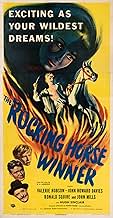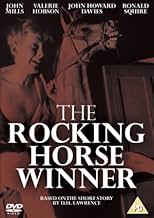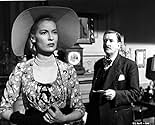IMDb-BEWERTUNG
7,2/10
1507
IHRE BEWERTUNG
Füge eine Handlung in deiner Sprache hinzuA young boy receives a rocking horse for Christmas and soon learns that he is able to pick the winning horse at the races.A young boy receives a rocking horse for Christmas and soon learns that he is able to pick the winning horse at the races.A young boy receives a rocking horse for Christmas and soon learns that he is able to pick the winning horse at the races.
- Regie
- Drehbuch
- Hauptbesetzung
Anthony Holles
- Bowler Hat
- (Nicht genannt)
Melanie Mackenzie
- Matilda Grahame
- (Nicht genannt)
Michael Ripper
- 2nd Chauffeur
- (Nicht genannt)
Johnnie Schofield
- 1st Chauffeur
- (Nicht genannt)
Caroline Steer
- Joan Grahame
- (Nicht genannt)
Empfohlene Bewertungen
One day, a fine young lad, played by John Howard Davies, gets a wooden rocking horse for a Christmas gift by his favorite uncle, a rich uncle. His father is a butterfingers with money, as he bets and loses it, while his wife, played by Valerie Hobson, is constantly at him, saying they need more money, we simply must have it. She, by the way, is used to having her way and used to living beyond their means. The uncle is her brother who has gotten them out of more than one financial scrape, who now refuses to do it anymore. He's done. The boy discovers by getting on the horse and rocking, that the horse not only talks to him, but gives him tips on the winners at the horse track. By way of betting through the groundskeeper, played by John Mills, the young boy amasses gads of money. And yet, what starts as a fantasy and a somewhat whimsical little film takes a dramatic and scary turn. This film has a little bit of everything for everyone: fantasy, humor, drama, and even a bit of the Gothic touch. The lesson to be learned from this film is simple: do not argue, or discuss money issues, in front of your children. One feels that maybe writer D. H. Lawrence, who wrote the short story from which this was based, may have lived a similar type of childhood but to a degree obviously. If it's draining for an adult, how do you think it makes children feel? This climax is made for a point for all adults - to learn from and change. A very dramatic and memorable film is "The Rocking Horse Winner." All the actors were exceptional, including the young lad, but the real star of the story is author D. H. Lawrence's imagination that tries to teach people the only way he can.
In London, the teenager Paul Grahame (John Howard Davies) lives with his upper class but financially broken family. His wasteful mother Hester Grahame (Valerie Hobson) is a compulsive buyer, spending all the family money in new expensive dresses, jewels and objects for their home. His father Richard Grahame (Hugh Sinclair) is a gambler, losing money in the horse races. His uncle Oscar Cresswell (Ronald Squire) is permanently covering the Grahame family debts. When the servant Bassett (John Mills) is hired, Paul finds that he can predict the winner of the horses' races rocking his wooden horse. Paul asks Bassett to become his partner, betting their money in the races, trying to prove that he is lucky and silencing the permanent whisper of the house needing more money. But the prize is high and fatal.
"The Rocking Horse Winner" is a dark tale of compulsion of D. H. Lawrence. I have never read his short story, and I did not feel any sexual connotation as mentioned in some reviews that I have glanced. The story is very disturbing and quite unpleasant, with great direction and performances, especially of Valerie Hobson in the role of a compulsive shallow woman. My vote is seven.
Title (Brazil): "O Cavalo Campeão" ("The Horse Winner")
"The Rocking Horse Winner" is a dark tale of compulsion of D. H. Lawrence. I have never read his short story, and I did not feel any sexual connotation as mentioned in some reviews that I have glanced. The story is very disturbing and quite unpleasant, with great direction and performances, especially of Valerie Hobson in the role of a compulsive shallow woman. My vote is seven.
Title (Brazil): "O Cavalo Campeão" ("The Horse Winner")
I first saw this film as a pare-teen many years ago and it stuck in my memory all these years; I suppose I identified, at the time, with the idea that events could be somehow manipulated and controlled by sheer intensity. When I recently saw this film on DVD, it still struck a nerve and, as an adult, realized what a strong film it is and why it had been in my memory all these years. Because the file is so old, many of the mannerisms in the movie appear quaint now, but the themes are timeless; sensitive kids sensing parental dysfunction and taking it upon themselves to try and "fix" things. It's interesting to note that John Mills, then a staple in English films, produced the film. I would recommend this film to anyone with a penchant for psychological drama of the old school.
The Rocking Horse Winner is directed by Anthony Pelissier, who also adapts the screenplay from the D. H. Lawrence short story of the same name. It stars Valerie Hobson, John Howard Davies, Ronald Squire, John Mills, Hugh Sinclair and Susan Richards. Music is by William Alwyn and cinematography by Desmond Dickinson.
Dreadful, Evil Money.
There's a handful of British films from the 1940s that deserve to be far better known, films that blended haunted themes with film noir traits and visual smarts. The Night Has Eyes, Uncle Silas, Corridor Of Mirrors and the magnificent Queen Of Spades readily come to mind. Now it has an official DVD release, we can add Anthony Pelissier's brilliant The Rocking Horse Winner to the obscure gem list.
Story has young Paul Grahame (Davies) receiving a weird looking Rocking Horse for Christmas. He's an introverted and sensitive lad, seemingly reaching out for some sort of guidance from his parents. Unfortunately his mother, Hester (Hobson), is a spendthrift badly hung up on money as some sort of status symbol, while his father, Richard (Sinclair), is a gambler, and not a good one at that. With Uncle Oscar Creswell (Squire) bailing them out of financial trouble for the last time, the Grahame family are heading for bankruptcy unless income can be found. Befriending the new handyman, Bassett (Mills), Paul is delighted to find that Bassett is an ex-jockey and regales him with tails of horse racing, he even learns from Bassett how to ride his Rocking Horse like a real jockey. Then something magical happens, Paul seems to be able to predict the winners of real horse races, and the money starts to roll in
D. H. Lawrence's story gets a faithful adaptation and transfers quite excellently to the screen. It's a haunting fantasy at heart, but one tinged with utter sadness, and being Lawrence it has a sex metaphor sitting right in the middle of the greed and exploitation thematics. As story progresses, it soon becomes evident that Paul has to ride his Rocking Horse to a frenzied climax, if he doesn't get there then he will not see the name of the next race winner. Initially he is thrilled to be able to win lots of money, the house seems to be telling him that his parents must have more money, so aided by Bassett, he is saving the cash to help his frantic mother, who by now has resorted to pawning possessions for cash. But the more he wins, and the more Bassett and Uncle Oscar also profit, the further away from his parents Paul gets. Soon enough it's going to come to a head and it will prove to be devastating for the Grahame family.
Pelissier, Alwyn and Dickinson each work respective wonders to smoother the picture with a sense of the unearthly, not so much supernatural, but like a blurry discord, a purgatory where ignorant parenting dwells and childhood innocence is corrupted. Pic is crammed with sinister imagery. The Rocking Horse itself is up in the attic, which gives the makers perfect opportunities for shadows to enhance the "unhealthy" scenes of Paul riding away like a boy possessed, while for the key scene Pelissier uses a depth perception technique that is gloriously disorientating. An ascent by Paul up to the attic is moody magnificence, Hester's visit to the back room Pawnbroker (Charles Goldner) drips with unease, while the finale features a near demonic last shot that literally will be burned into your soul.
With top performances from the cast to seal the deal, this tale of a boy and his Rocking Horse gnaws away at the senses as the fallibility of the human condition is frighteningly laid bare. 9/10
Dreadful, Evil Money.
There's a handful of British films from the 1940s that deserve to be far better known, films that blended haunted themes with film noir traits and visual smarts. The Night Has Eyes, Uncle Silas, Corridor Of Mirrors and the magnificent Queen Of Spades readily come to mind. Now it has an official DVD release, we can add Anthony Pelissier's brilliant The Rocking Horse Winner to the obscure gem list.
Story has young Paul Grahame (Davies) receiving a weird looking Rocking Horse for Christmas. He's an introverted and sensitive lad, seemingly reaching out for some sort of guidance from his parents. Unfortunately his mother, Hester (Hobson), is a spendthrift badly hung up on money as some sort of status symbol, while his father, Richard (Sinclair), is a gambler, and not a good one at that. With Uncle Oscar Creswell (Squire) bailing them out of financial trouble for the last time, the Grahame family are heading for bankruptcy unless income can be found. Befriending the new handyman, Bassett (Mills), Paul is delighted to find that Bassett is an ex-jockey and regales him with tails of horse racing, he even learns from Bassett how to ride his Rocking Horse like a real jockey. Then something magical happens, Paul seems to be able to predict the winners of real horse races, and the money starts to roll in
D. H. Lawrence's story gets a faithful adaptation and transfers quite excellently to the screen. It's a haunting fantasy at heart, but one tinged with utter sadness, and being Lawrence it has a sex metaphor sitting right in the middle of the greed and exploitation thematics. As story progresses, it soon becomes evident that Paul has to ride his Rocking Horse to a frenzied climax, if he doesn't get there then he will not see the name of the next race winner. Initially he is thrilled to be able to win lots of money, the house seems to be telling him that his parents must have more money, so aided by Bassett, he is saving the cash to help his frantic mother, who by now has resorted to pawning possessions for cash. But the more he wins, and the more Bassett and Uncle Oscar also profit, the further away from his parents Paul gets. Soon enough it's going to come to a head and it will prove to be devastating for the Grahame family.
Pelissier, Alwyn and Dickinson each work respective wonders to smoother the picture with a sense of the unearthly, not so much supernatural, but like a blurry discord, a purgatory where ignorant parenting dwells and childhood innocence is corrupted. Pic is crammed with sinister imagery. The Rocking Horse itself is up in the attic, which gives the makers perfect opportunities for shadows to enhance the "unhealthy" scenes of Paul riding away like a boy possessed, while for the key scene Pelissier uses a depth perception technique that is gloriously disorientating. An ascent by Paul up to the attic is moody magnificence, Hester's visit to the back room Pawnbroker (Charles Goldner) drips with unease, while the finale features a near demonic last shot that literally will be burned into your soul.
With top performances from the cast to seal the deal, this tale of a boy and his Rocking Horse gnaws away at the senses as the fallibility of the human condition is frighteningly laid bare. 9/10
The dialogue is expectedly very British and good. Though a perfunctory performance was all the needlessly limited role of the father required, all other players did wonderfully.
Interestingly, the story concerns a good, but sybaritic mother's avarice and her loving son's obsessive desire to satisfy it. It also plays into the idea of money as an inherent evil while earning my high praise by not taking this too far. It is also another one of many films I have enjoyed on the fascinating subject of gambling.
Interestingly, the story concerns a good, but sybaritic mother's avarice and her loving son's obsessive desire to satisfy it. It also plays into the idea of money as an inherent evil while earning my high praise by not taking this too far. It is also another one of many films I have enjoyed on the fascinating subject of gambling.
Wusstest du schon
- WissenswertesBassett says that he had "... fine plans for teaching Gordon Richards a thing or two...". Gordon Richards (1904 - 1986) was an English jockey. He was the Champion Jockey in British flat horse-racing 26 times, a record that still stands.
- Zitate
[last lines]
Hester Grahame: I wanted to see the end of it, just wanted to be sure it had gone. Gone for good.
Bassett: You won't never see the end of it, ma'am, nor will I. As long as ever we'll live, we'll remember, and we'll know just what it is was done.
- VerbindungenVersion of Winner (1977)
- SoundtracksSilent Night
(uncredited)
Music by Franz Xaver Gruber
English lyrics by John Freeman Young
Sung by the carollers
Top-Auswahl
Melde dich zum Bewerten an und greife auf die Watchlist für personalisierte Empfehlungen zu.
Details
- Erscheinungsdatum
- Herkunftsland
- Sprache
- Auch bekannt als
- Dobitnik sa drvenog konjića
- Drehorte
- Denham Studios, Denham, Buckinghamshire, England, Vereinigtes Königreich(studio: made at Denham Studios, London, England)
- Produktionsfirmen
- Weitere beteiligte Unternehmen bei IMDbPro anzeigen
- Laufzeit
- 1 Std. 31 Min.(91 min)
- Farbe
- Seitenverhältnis
- 1.37 : 1
Zu dieser Seite beitragen
Bearbeitung vorschlagen oder fehlenden Inhalt hinzufügen





























